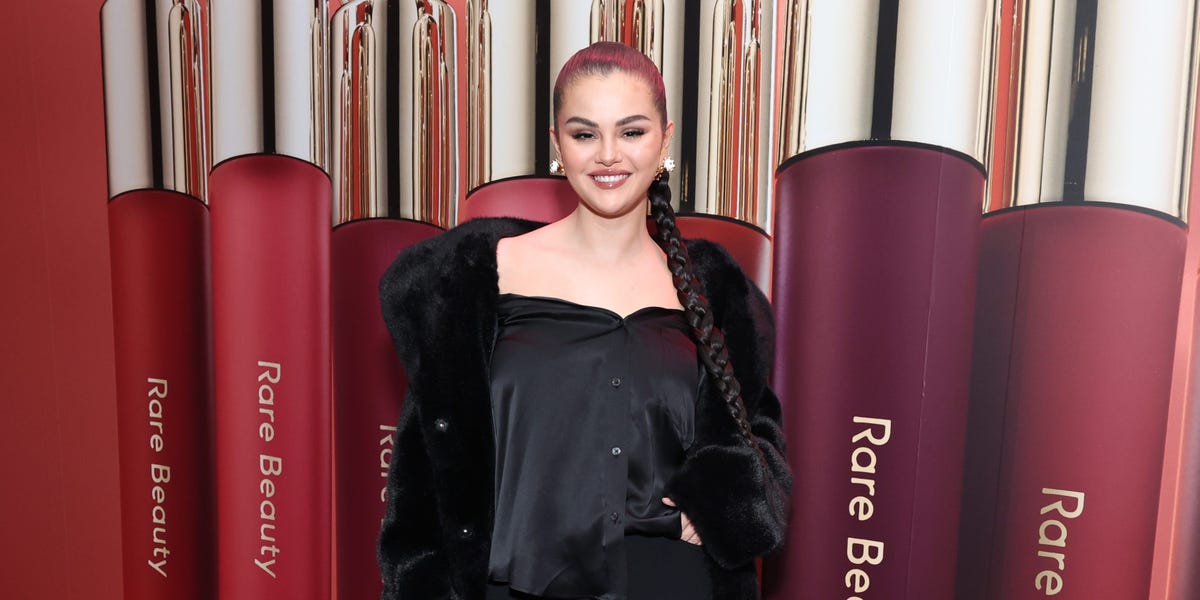There are currently at least 40 celebrity beauty brands on the market — all experiencing varying degrees of success.
Some, like Hailey Beiber’s Rhode, have gained a following among devoted fans; others, like Addison Rae’s Item Beauty, have quietly fizzled out, and still more, like Brad Pitt’s Le Domaine, have barely made a splash in the first place.
Very few have become significant players, and even fewer have reached valuations high enough to catapult themselves to the top of the industry and their celebrity creators to billionaire status.
Still, there are notably successful billionaire founders. Take Rihanna, whose $1.4 billion fortune is largely made up of her stake in Fenty Beauty, which she co-owns with LVMH. Kim Kardashian is worth $1.7 billion, partly due to her stake in SKKN by Kim and the $200 million from her sale of 20% of the company (then named KKW Beauty) to Coty in 2020.
Now, Selena Gomez may be poised to join their ranks and become the next celebrity beauty billionaire.
This week, Bloomberg reported that the singer has enlisted advisors to help her field incoming investor interest in her cosmetics line Rare Beauty. Business of Fashion previously reported that the company is seeking a valuation of $2 billion.
“I was not surprised by the price tag, as it’s a healthy brand with loved products,” said Anncy Rowe, a beauty industry expert who is the CMO of skincare brand StriVectin and previously worked at L’Oréal for nine years.
While the details behind any potential sale aren’t clear, Business Insider took a look at the financials.
When it comes to the valuation, Rare Beauty’s financial figures aren’t public, and representatives of Gomez and Rare Beauty did not respond to requests for comment from Business Insider.
But Business of Fashion estimated the company brought in $350 million in net sales last year, while Fast Company estimated revenue of $300 million. With price-to-sales ratios ranging from 1.8x (Coty) to 5.8x (L’Oréal) among public beauty companies, a $2 billion valuation could be a stretch — but could still be on the table. (EBITDA multiples are a much more accurate determinator of a company’s valuation, but there are no public estimates of those data.)
“Even if the $2 billion is probably unlikely, $1 billion is still a huge number,” Jeffrey Ten, a beauty industry veteran who is now the CEO of Global Indie Brand Development, told BI.
Gomez’s stake in the company also isn’t known, but it’s likely significant. The business has no parent company or corporate partner. Besides Gomez, Scott Friedman, Rare Beauty’s CEO, and Nikki Eslami, the cofounder of VC firm New Theory Ventures, are its most well-documented investors.
So, assuming a nine-figure payout, the value of any remaining stake in the company, and a cash pile from years of performing — her 2016 “Revival” tour grossed $35.6 million, per Pollstar — and acting, Gomez’s net worth could hit $1 billion.
Rare Beauty’s rare success story
Rare Beauty is one of the few celebrity beauty brands to have earned continuous praise since it launched in 2020. Many have said it transcends the “celebrity brand” moniker and has become a well-respected cosmetics company. Its success has been touted on earnings calls from companies like Kohl’s — where it’s sold in Sephora departments — to manufacturer Elementis.
While Gomez is instrumental in the company’s decisions, its C-suite is full of industry professionals. CEO Friedman, COO Mehdi Mehdi, and chief product officer Joyce Kim all came from Nyx Cosmetics, an independent beauty company that sold to L’Oréal for $500 million in 2014.
The brand has also won massive popularity among influencers and social media users.
Rare Beauty has the highest earned media value — a metric that quantifies the estimated monetary value of social engagement — of all US cosmetic companies, celebrity or not, according to social media marketing firm CreatorIQ. It’s among the most-followed celebrity beauty brands on both Instagram and TikTok, with 7.1 million and 3.6 million followers, respectively.
That reputation makes it potentially desirable for legacy giants like Coty, L’Oréal, or Estée Lauder, which have significantly lower EMVs, according to CreatorIQ’s data.
“She’d be a huge catch for the big guys,” Ten said.
Rare Beauty’s online popularity “gives an indication of its value on the street today,” he added. “Makeup brands are driven by social media. What goes on social media sells in the stores — it’s black and white.”
Another plus for the company is that it has room to grow. Rare Beauty is only available online and at Sephora, limiting the countries where it can be purchased.
“Whoever does end up buying it has a tremendous opportunity,” Ten said, adding that he could see the brand expanding to Ulta and regional partners. “There’s a lot of the world left where Sephora is not.”
To be sure, celebrity brands’ popularity can ebb and flow. Even the most long-lasting ones — like Elizabeth Taylor’s White Diamonds perfume — have moved to the background as newer, more relevant ones emerge. In today’s market, where seemingly every actor, singer, and influencer is launching a product, there’s even more chance of being pushed aside.
“The challenge for potential investors will be to understand how it will continue to scale in a crowded landscape,” Rowe said.
But four years after launch, Gomez remains Rare Beauty’s best asset. With 429 million Instagram followers, she’s been one of the most followed people on the platform for a decade, and her “authentic, nuanced involvement” in Rare Beauty sets it apart, Alex Rawitz, the director of research and insights at CreatorIQ, told BI over email.
“Between her frequent presence at brand events and her role in the product development process, Rare Beauty avoids the ‘money grab’ label that often plagues other celebrity/influencer brands,” he added.
If, as the Bloomberg report suggests, she plans to stay at the company, it doesn’t seem like Rare’s success is going anywhere.
So buyers, if you’re ready, come and get it.
Read the full article here





